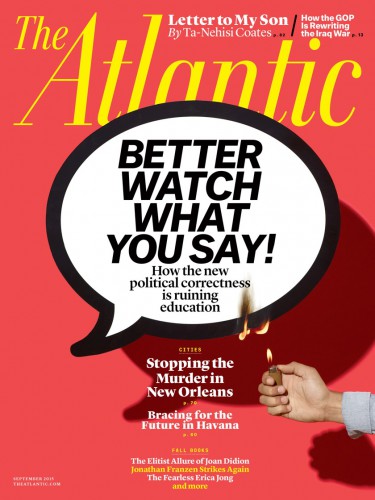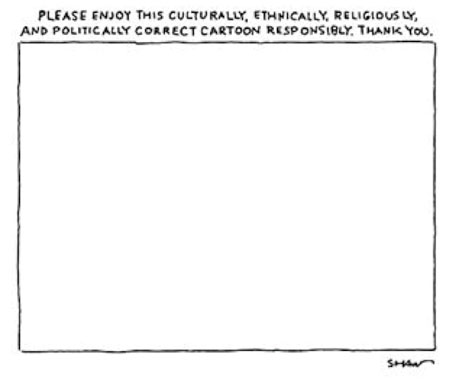
I promise you, I had no intention of writing about this subject again. Not for a long while at least. I’m talking about the whole culture of offense/outrage/oversensitivity/correctness/humorlessness/what-have-you that seems to have overtaken our nation’s universities, and by extension vast swaths of media, social and otherwise. It may be one of the primary places where the thematic rubber is meeting the road (for now), but it doesn’t bring out a terribly hopeful side. And one needs all the optimism one can get, especially at the dawn of a new semester. Or election.
Plus, we’ve already covered most of this stuff at considerable length: we’ve talked about what the phenomenon says about the contemporary search for purpose/meaning. We’ve looked at it through the lens of power. Most of all, we’ve tried to explore the clear religious impulses at work. (The real issue not being propriety so much as purity/righteousness). So why risk sounding grumpy? Or, worse, old? Why not link to The Onion again and be done with it?
 I wanted to. But then I actually read the article Ethan mentioned the other day, Greg Lukianoff and Jonathan Haidt’s cover opus for The Atlantic, “The Coddling of the American Mind”. Basically, it is too compelling and valuable to ignore (Todd’s take is coming tomorrow). Even bearing in mind that publication’s penchant for sensationalism, the two men nailed it–but not simply because they describe the phenomenon in such incredulity-inducing detail or affirm previously held suspicions about what’s going on.
I wanted to. But then I actually read the article Ethan mentioned the other day, Greg Lukianoff and Jonathan Haidt’s cover opus for The Atlantic, “The Coddling of the American Mind”. Basically, it is too compelling and valuable to ignore (Todd’s take is coming tomorrow). Even bearing in mind that publication’s penchant for sensationalism, the two men nailed it–but not simply because they describe the phenomenon in such incredulity-inducing detail or affirm previously held suspicions about what’s going on.
The article derives its power from the attitude of the writers, which isn’t one of anger so much as compassion–yes, for their fellow professors and journalists but mainly for the students themselves. It’s easy to blame the kids after all, especially when they are (unrepentantly) making your life so difficult. Just wait til they get to the ‘real’ world, we say. Rude awakening time! Does Amazon have any openings?
Tempting as it may be, we all know where oppositional stances like that lead, even when they’re well-founded. Blame, like the law, tends to perpetuate the dynamics it addresses, something particularly pronounced when dealing with those in the flush of empowered young adulthood. But Lukianoff and Haidt are wise. They do not minimize the very real pain that is often in play here. Nor do they deny that most of the factors involved predate the social media generation. Instead, their chief concern seems to be the toll that this spirit of “vindictive defensiveness” (their phrase) is taking on students themselves, both in terms of mental health and learning itself.
What struck me as particularly fresh, at least for Mbird purposes, was their discussion of “emotional reasoning”. It not only lies at the heart of a lot of what is going on, it sounds a lot like the way certain kinds of religious people talk. At least, those who place a strong emphasis on personal testimonies and/or revelation:
Burns defines emotional reasoning as assuming “that your negative emotions necessarily reflect the way things really are: ‘I feel it, therefore it must be true.’ ” Leahy, Holland, and McGinn define it as letting “your feelings guide your interpretation of reality.” But, of course, subjective feelings are not always trustworthy guides; unrestrained, they can cause people to lash out at others who have done nothing wrong. Therapy often involves talking yourself down from the idea that each of your emotional responses represents something true or important.
Emotional reasoning dominates many campus debates and discussions. A claim that someone’s words are “offensive” is not just an expression of one’s own subjective feeling of offendedness. It is, rather, a public charge that the speaker has done something objectively wrong. It is a demand that the speaker apologize or be punished by some authority for committing an offense…
Because there is a broad ban in academic circles on “blaming the victim,” it is generally considered unacceptable to question the reasonableness (let alone the sincerity) of someone’s emotional state, particularly if those emotions are linked to one’s group identity. The thin argument “I’m offended” becomes an unbeatable trump card. This leads to what Jonathan Rauch, a contributing editor at this magazine, calls the “offendedness sweepstakes,” in which opposing parties use claims of offense as cudgels…
If our universities are teaching students that their emotions can be used effectively as weapons—or at least as evidence in administrative proceedings—then they are teaching students to nurture a kind of hypersensitivity that will lead them into countless drawn-out conflicts in college and beyond. Schools may be training students in thinking styles that will damage their careers and friendships, along with their mental health…
I know. The weaponization of grievance–that sounds dark. And yet, if our low anthropology tells us anything, it’s that our capacity (and ingenuity) for self-vindication is immense. We’ll use whatever we have at our disposal.
The alluring thing about unrestrained subjectivity–and by that I mean the exaltation of the self above any/all other arbiters of meaning–is that it resembles freedom from afar. But up close we often find it to an unreliable and frequently cruel mistress. This goes for all of us, religious or not.
https://www.youtube.com/watch?v=tAc3RRkGk9Y
The danger, of course, is the same one we see in church circles: that, in reaction, we vilify or stigmatize emotion and retreat to cold-hearted propositions. Emotional dis-integration is not the answer, and Lukianoff and Haidt do not suggest it is. It’s more emotional absolutism that they take issue with.
Perhaps a more constructive, and emotionally healthy, approach would start from the assumption that no perfectly inoffensive language exists because no perfectly inoffensive people do. This doesn’t mean that some words or practices aren’t more hurtful or destructive than others–of course not–but even if there were a purified vocabulary for us all to use, we could talk until we were blue in the face, and our attitudes wouldn’t necessarily soften. The internal bigotry which is our common lot cannot be transformed into something unbiased by force.
As canned as it may sound, this is a big part of what makes Christianity such good news–its objectivity is precisely what gives it subjective power. That is, the fact of assurance creates rather than responds to emotional well-being. You might even say it triggers it. This is what Ada Calhoun spelled out in relational terms so vividly a few weeks in the Times.
What I’m trying to say is that when I read articles like Haidt and Lukianoff’s, it’s usually a discouraging experience. But every so often something funny happens: the discouragement gives way to gratitude. Gratitude that, while human capriciousness may know no bounds, the forgiveness of sins is not contingent upon a sinner’s (read: my) compromised and ever-fluctuating feelings about him-/herself, other people, or even the Forgiver. It is dependent only on the one doing the forgiving.
Which means the promise of eternal safety cannot be weaponized, even for the sake of justice–because it extends first and foremost to the unjust, the (re-)offender. And that’s offensive.

COMMENTS
12 responses to “Just Cause You Feel It: Emotional Coddling in a Culture of Offense”
Leave a Reply














Thanks for your thoughts. Maybe it’s time to revisit David Mamet’s “Oleanna.”